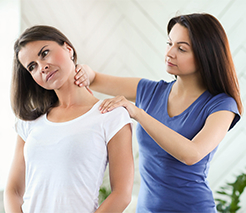- Jumeirah - Dubai - UAE
Causes:
Age-Related Wear and Tear: Osteoarthritis commonly occurs with aging, leading to degeneration of knee cartilage.
Joint Injury: Previous knee injuries or trauma can increase the risk of osteoarthritis.
Obesity: Excess body weight puts additional stress on the knee joints, contributing to osteoarthritis.
Genetics: Some individuals may have a genetic predisposition to developing osteoarthritis.
Joint Overuse: Repetitive stress on the knee joints due to certain occupations or activities.
Gender: Women are more prone to osteoarthritis, especially after menopause.


Strengthening Exercises: Targeted exercises to strengthen the muscles around the knee, providing better joint support.
Range of Motion Exercises: Exercises to improve flexibility and maintain the full range of motion in the knee joint.
Low-Impact Aerobic Exercises: Activities like swimming or cycling to enhance cardiovascular health without stressing the knee.
Joint Mobilizations: Manual therapy techniques to improve joint mobility and reduce stiffness.
Heat and Cold Therapy: Application of heat to soothe joint pain and cold therapy to manage inflammation.
Gait Training: Correction of walking patterns to reduce stress on the knee joints.
Bracing: Provision of knee braces or supports to provide stability and alleviate pain.
Weight Management: Guidance on maintaining a healthy weight to reduce stress on the knee joints.
Education and Lifestyle Modification: Providing information on joint protection strategies and lifestyle changes.
Pain Management Techniques: Implementation of modalities like ultrasound or TENS for pain relief.
A physiotherapist will conduct a thorough assessment to tailor a treatment plan based on the individual’s specific condition and needs. Physiotherapy aims to manage symptoms, improve function, and enhance the overall quality of life for individuals with knee osteoarthritis.
